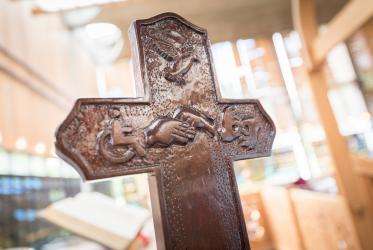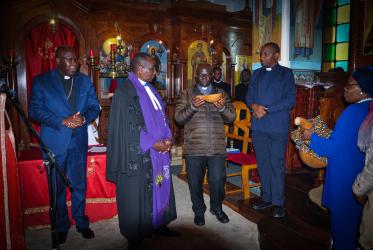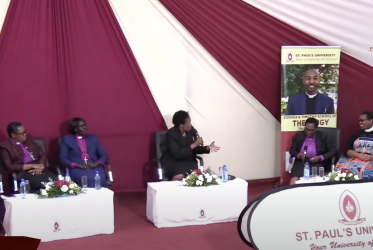By Marcelo Schneider*
Dr Samuel Kabue, an ordained elder of the Presbyterian Church of East Africa, has been the person behind the solid work of the Ecumenical Disability Advocates Network (EDAN) over the past years. On 6 October, he was interviewed by WCC communications, in Geneva, and talked about his memoirs, “From the Village to the World”, the importance of inclusiveness and the loud prophetic voice of the minorities in church and society.
“The key message that I’d like to put forward with this book is that of giving people chances. I say this because I am what I am because people gave me a chance to prove myself”, he says, using as an example his time working at the National Council for Churches of Kenya (NCCK).
“In the early 90s, I joined the NCCK to establish a disability program. At that time, they thought that was all I could do. In this role, the general secretary recognized that my potential was beyond just doing disability work. I became the director of the advocacy unity, a sector of the NCCK that brought together civic education, economic justice, peace and reconciliation, gender justice, youth work, disability and family life education. I had a staff of more than 60 and I did the job well. This all happened because somebody gave me a chance”, reflects Kabue.
The autobiography brings stories from the three main phases of his personal life: the life in the village, the several steps in the professional career and his involvement in the ecumenical movement.
The early days
“I was born during the colonial days when things were very, very hard in Kenya. I got into secondary school just a few years after the independence and there were a lot of hopes for the young people who have been able to achieve secondary school education. I lost my sight at that time, at the age of 16, right after going into secondary school. I had a very quick transition, I joined the school for the blind quite quickly. Luckily, my blindness was sudden. When it is slow, people take so long to accept it. But the doctors, in my case, quite quickly pronounced that I was blind irreversibly. That was a huge challenge for me, getting to learn in a different way and in a totally different environment. But I did well in school. In my youth, I also worked very close with the Evangelical teams from the Kenyan Students Association that have coming to place in the mid-70s. That was another key landmark in my life because that's even how I met my wife.”
Perseverance
“Before joining the university, I realized that I wanted to be a church minister. At that time, in my church, there was quite a hierarchy of authority that stated that if you wanted to join the theological institution you should be recommended by your local church, who forwards your name to the parish, and the parish, if they approve, would forward your name to the presbytery that would then forward your name to the training committee. If that chain of command was broken at any point you could not join. But my letters were not leaving my local parish. No reasons were given. So I couldn't join the theological institution. I consulted with the secretary of the training committee, who was at that time Dr David Philpot, who later worked at the WCC as the executive secretary for scholarships. It was him who encouraged me and told me: ‘These people don’t want to recommend you. Just go to the university. After that, you will be able to study. And if you still want to go to the theological institution you can go after that’. And that’s what happened. I went to the University of Nairobi, studied a bachelor’s degree in education, but at the end of my course I was still interested in theology.”
At that time, a British missionary put Kabue in contact with an organization called Christoffel Blindenmission, from Germany, who offered him a scholarship to study theology provided that his church would sign that he works with them when he comes back. That was in 1978.
“But the church could not commit itself to that. And so I missed the chance again. So I took up a job at the government as a teacher and I continued with the teaching profession", he said.
Ecumenical engagement
Only in 1989, Kabue would get a WCC scholarship to go and study Special Needs Education in England. It is after coming from England, in 1990, that he joined the ecumenical world, first at the NCCK, where he worked until 1998.
“At the WCC 8th Assembly, in Harare 1998, I was invited as an advisor, and it is after that event that EDAN was founded. I was asked to coordinate EDAN on a part time basis. That led to an increase in the work, and, in 2003, I had to leave my job at the NCCK and take up EDAN full time”, he remembered.
The memoirs pay tribute to the many people who helped Kabue several times his life, like the former WCC general secretary Rev. Dr Samuel Kobia.
Kabue received his training from the University of Birmingham where he graduated with Masters of Education Degree (Special Education). He holds a Masters of Education Degree (Administration and Language Teaching) and Bachelors of Education Degree (English and History) from the University of Nairobi.
In 2012, Dr Kabue graduated with Masters degree in Theology from St. Paul’s University, Limuru, Kenya. His exemplary work made him being awarded Doctor of Divinity degree by the Senate of Serampore University, India in 2011.
Kabue closes the interview emphasizing that “one of the biggest problems of people with disability is that they are rarely given a chance to prove what they can be. Inclusion is a key concern. You cannot give people a chance unless they are included and you can discover their potential”, he added.
To get a copy of the book, please contact [email protected]
Ecumenical Disability Advocates Network
Free high resolution pictures of Dr Kabue for download
*Dr Marcelo Schneider works as communication officer at the World Council of Churches.







